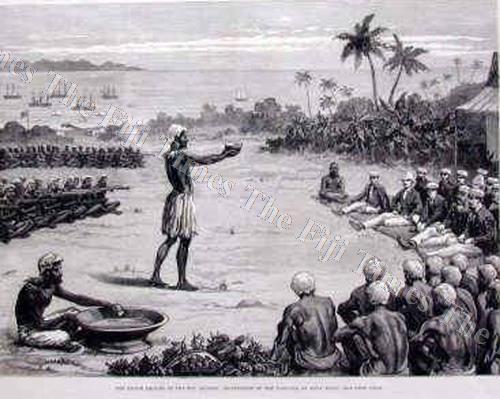AS Their Royal Highnesses, The Duke and Duchess of Sussex, Prince Harry and his wife Meghan descend onto our shores on their whirlwind tour of the South Pacific, we take a look back on the past royal visits to the country spanning more than 100 years.
For Fiji, it began 139 years ago in 1879 when the Vunivalu of Bau (Warlord of Bau) and paramount Chief Ratu Seru Cakobau first ceded Fiji to Queen Victoria in exchange for protection.
As part of his submission and loyalty, Ratu Seru Cakobau considered the “Tui Viti” or King of Fiji had gifted Queen Victoria his war club.
The prized war club was called Na Tutuvi Kuta nei Radi ni Bau (The sleeping cover of the Queen of Bau) referring to the traditional duty of the Vunivalu to protect the principal wife of the Rokotui Bau and could be taken to mean Cakobau accepted protection from Queen Victoria and her successors.
Neither Queen Victoria nor her successors ever used the title of Tui Viti, but the Fijians considered them Kings and Queens of Fiji in the traditional sense of Tui Viti, not just in the Western sense of Sovereign.
That traditional respect will once again be shown to the second son of the Prince of Wales at Albert Park, Suva this evening.
It’s interesting to note that the first British royal visit to Fiji was in September 1881 when two princes arrived in the British Flying Squadron of five ships to Levuka, Fiji’s old capital.
They were the grandsons of Queen Victoria — Prince George and his brother Prince Albert Victor.
Prince George was just 15-years-old while his brother was 17.
There is a great account of their visit and the ceremony in the illustrated London Times with an excellent woodcut of the presentation showing Ratu Timoci, son of Ratu Seru Cakobau, actually being the cup bearer.
It was described that Ratu Seru Cakobau for the first time in his life stood and presented to the two princes a tabua (whales tooth considered the highest form of traditional respect) himself.
It was also the first time for Ratu Timoci to carry out the traditional yaqona ceremony.
The main ship of the fleet had an auxiliary steam engine and generator and that night they shone their spotlight on the scene.
It was probably the first use of electricity in Fiji.
In an article published by The Fiji Times of the occasion, it described how during the ceremony, the yaqona or kava root was chewed by young men and women and the proceeds were then thrown in dabs on a wooden bowl before water was added into it and stirred (which was the method then).
On the occasion when the yaqona was presented to both brothers, “Prince Albert consumed his portion with a sort of deliberate air, but his younger brother tossed his bowl off right merrily, an act of self-devotion which considering the amount of human saliva usually present in the mixture was highly commendable”.
The younger Prince George of Wales would later succeed his brother to the British throne after Prince Albert’s unexpected death during the influenza epidemic in early 1892.
Since then many of Queen Victoria’s descendants have visited Fiji over the years which included Prince Edward (later King Edward VIII), the Duke of York (later King George VI) and his wife Queen Elizabeth I) and their daughter, the longest reigning British monarch Queen Elizabeth II (a record six times), and Prince Charles. Prince Harry continues the rich tradition this week.






